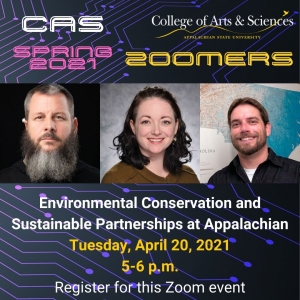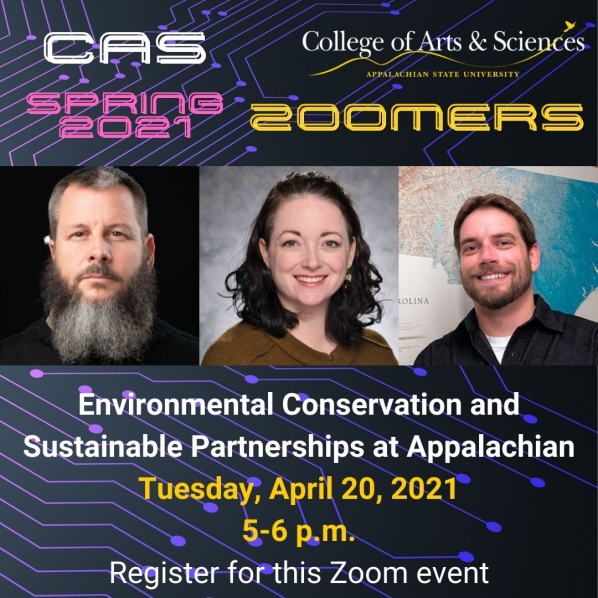Tuesday, April 20, 2021
5-6 p.m.
Zoom Registration - click to register
This event is free and open to the campus and community.
Dr. Matt Estep is an associate professor of evolutionary genetics in the Department of Biology. The Amphibolite Mountains, located in northwestern North Carolina (Watauga and Ashe counties), are home to many unique plant species. Due to the distinct geology of the area and deep position within the Southern Appalachians, these unglaciated peaks acted as refugia during previous ice ages and today harbor many rare and disjunct species. Small, isolated populations of plants, high on the Amphibolite peaks, are vulnerable to extinction due to a variety of factors (for example, climate change, land development and outdoor recreation). Estep’s lab group focuses on documenting this biodiversity and providing local land managers with valuable demographic or genetic data to help develop management plans that ensure the preservation of our state's natural heritage.
Dr. Christine Hendren is a professor of nanomaterial risk assessment and integration and implementation sciences (I2S) in the Department of Geological and Environmental Sciences. She is also the new Director of RIEEE, Appalachian’s Research Institute for Environment, Energy and Economics. Her work focuses on developing and applying methods, models and human processes to integrate and co-create knowledge across boundaries – disciplinary, sectoral, cultural, geographic – to lead research teams in addressing complex global challenges. She came to this work through problem-based convergent research in the field of nanomaterial environment, health and safety research, which coalesced a broad range of expertise and methods to elucidate what governs nanomaterial behavior and impacts, and translate this understanding into directional guidance for managing potential risks.
Dr. Mark Spond is the National Park Service Liaison for the university and his home academic department is Geography and Planning. The primary function of the liaison position is to manage competitively-awarded task agreements between Appalachian and the National Park Service. Spond has worked extensively in the Southeast with the NPS Youth Programs Division and NPS Cooperative Ecosystems Studies Units Program. These partnerships permit App State to enter task agreements that allow students and recent graduates to secure paid employment working at National Parks and other NPS units. Agreements with NPS sites that address diverse natural and historical resources (e.g., Blue Ridge Parkway, Great Smoky Mountains, Cowpens National Battlefield) provide outstanding opportunities for both members of the Appalachian community and the locations at which the students and graduates are stationed. In addition to serving as the Liaison to the National Park Service, Spond teaches and conducts research on environmental history.
###
About the Department of Biology
The Department of Biology is a community of teacher-scholars, with faculty representing the full breadth of biological specializations — from molecular genetics to landscape/ecosystem ecology. The department seeks to produce graduates with sound scientific knowledge, the skills to create new knowledge, and the excitement and appreciation of scientific discovery. Learn more at https://biology.appstate.edu.
About the Department of Geography and Planning
The Department of Geography and Planning promotes the understanding of the spatial dimensions of human behavior within the physical and cultural systems of the earth, and the role of planning in achieving improvement in those systems. The department offers degrees in geography and in community and regional planning. Learn more at https://geo.appstate.edu.
About the Department of Geological and Environmental Sciences
Located in Western North Carolina, Appalachian State University provides the perfect setting to study geological and environmental sciences. The Department of Geological and Environmental Sciences provides students with a solid foundation on which to prepare for graduate school or build successful careers as scientists, consultants and secondary education teachers. The department offers six degree options in geology and two degree options in environmental science. Learn more at https://earth.appstate.edu.
About the Research Institute for Environment, Energy and Economics
Since 2008, Appalachian State University’s Research Institute for Environment, Energy, and Economics (RIEEE) has fostered interdisciplinary research on the environment, energy and economics, especially the areas in which these subjects intersect. The institute serves as an umbrella organization for three centers: the Appalachian Energy Center, Center for Economic Research and Policy Analysis (CERPA) and the Southern Appalachian Environmental Research and Education Center (SAEREC). The work supported by RIEEE is integrated into Appalachian’s academic programs, used to facilitate discovery among K-12 student students and teachers, and employed in the region’s economic development. Learn more at https://rieee.appstate.edu.
About the Appalachian State University Liaison to the National Park Service
The Appalachian State University Liaison to the National Park Service (NPS) is the central contact for initiatives that partner Appalachian with NPS units across the United States. The liaison promotes opportunities, such as service projects and task agreements, that mutually benefit NPS units and university students, faulty, staff and alumni. Past projects have partnered members of the Appalachian Community with NPS natural/cultural resource personnel, interpreters and educational initiatives. Learn more at https://npsliaison.appstate.edu.

